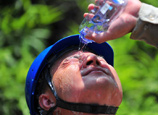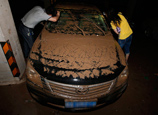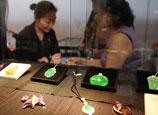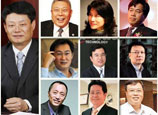
BEIJING, July 11 (Xinhua) -- A controversial study suggesting the life expectancy of people in north China has been years lower than in the less-polluted south was only a statistical estimate and its context must be understood, one of the report's lead authors said on Thursday.
Analyzing pollution and mortality information for 90 cities between 1981 and the year 2000, the study found that the 500 million residents north of the Huai River, where air pollution from coal-fired heating was 55 percent higher than in the south, lost more than 2.5 billion life years during the 1990s, or 5.5 years on average.
Since its publication online on Monday by Proceedings of the National Academy of Sciences, the official journal of the U.S. National Academy of Sciences, the report has made headlines across domestic and international news media.
However, Chen Yuyu, professor with the Guanghua School of Management under Peking University, told Xinhua in an exclusive interview that the results had been misinterpreted and taken out of context by some journalists. He said that the results came on the premise that all other factors were kept controlled, such as nutrition, medical treatment and life styles.
"It's indisputable that people's life expectancy has been increasing thanks to economic development and improvements in other aspects. It's just that it could have increased more were it not for air pollution," said Chen, who was one of the first authors of the report, which involved experts from China, the United States and Israel.
In other words, the increasing life expectancy of people in north China was reduced by five years due to more serious air pollution between 1981, when the free winter heating policy went into full swing in the north, and 2000. The heating policy saw the introduction of many coal-powered heaters, an unintended side effect of which was the creation of much additional air pollution.
"It's thus inappropriate to simply say that coal-heating cuts short longevity," said Chen.
While stressing that the study did consider other factors' possible effects on the results, Chen pointed out the findings of the study were a statistical inference, rather than from a medical or pathological approach.
Meanwhile, there are concerns that the result was rather rough as the study only took into account total suspended particulates (TSPs), which are mostly larger-sized and less toxic particulates than PM2.5.
Admitting the data studied was not "ideal," Chen said that the findings are open to discussion and that he expects studies using other approaches to shed more light on the issue.
More significantly, according to the author, their study was based on data from China's period of rapid industrialization during the 20 years covered and offers particularly useful references for developing countries, while previous studies on the costs and effects of pollution control mostly used data from the United States.
The findings suggest that long-term exposure to an increase of 100 micrograms of particulate matter per cubic meter in TSPs leads to a three-year decline in life expectancy. Chen hopes that the study can help the government assess the impact on health inflicted by environmental pollution and adopt more forceful legislative and administrative measures so as to build a greener economy and reduce pollutant emission.
He said that the country's pollution prevention and control drive should focus on three issues: the ramifications of pollution, main sources of pollutants and looking for the most cost-effective, sustainable and widely-supported policies and measures.
The author cited the provisional emission reduction policies implemented throughout the Beijing Olympics in 2008 as a non-sustainable approach that transitorily improved the environment at very high social and economic costs. During the Olympics, potentially-polluting enterprises and constructions projects were suspended and vehicles were restricted.
"More scientific ways to reduce emissions are needed," Chen said.
















 Rainstorms flood more than 10,000 cars in underground garages in Wuhan
Rainstorms flood more than 10,000 cars in underground garages in Wuhan


![]()
